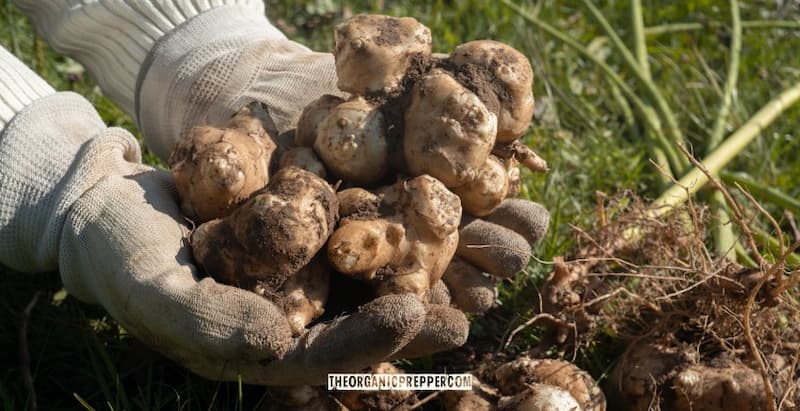() I’m really trying to boost my food production at my place this year, and it’s gotten me thinking about what plants I want to add to my place to do so. For years now, I’ve wanted to experiment with Jerusalem artichoke. I find it in the mountains when I go hiking (it’s pretty easy to identify), I see it in the garden catalogs, but it’s yet to find its way over to my place.
Related Top 5 Cancer-Fighting Vegetables (With Recipes!)
This year, I’m hoping to change that.
Here are some of the reasons you may want to add Jerusalem artichoke to your place as well.

Jerusalem artichoke is a perennial.
This is one of the things that Rick Austin and Gaia’s Garden really harp on consistently – the importance of planting perennials if you want to have any semblance of permaculture. You can plant this stuff one time, and provided you don’t over-harvest, you’ll have a steady crop of it for years to come.
(Looking for more information on how to stay well-fed post-disaster? Check out our free QUICKSTART Guide to what to eat when the power goes out.)
J-choke multiplies like a weed.
Though it’s a native American plant, you would think this stuff came from overseas – the stuff spreads like wildfire. It’s fun to see patches of it spread out in the mountains over the years. The same can happen in your garden. Plant J-choke in one location, and it won’t be long till it gradually spreads, much like asparagus. To my mind, that’s a big win here.
Not only do I get food every year after one afternoon’s work, but it’s a food that multiplies itself exponentially as time goes on (much akin to planting a fruit tree – a few minutes of planting and years’ worth of harvest).
The tubers are akin to potatoes.

This is where I start to jump out of the realm of personal experience. I’ve never eaten Jerusalem artichokes, nor have I ever eaten turtle. I want to try both. I first discovered that these things were edible after reading Euell Gibbon’s wonderful book Stalking the Wild Asparagus. The man’s family almost starved to death during the Dust Bowl. It was his foraging that enabled his family to eat, and Jerusalem artichokes were apparently one of the foods he would gather.
On pages 26-27 of his book, Gibbons outlines a number of recipes for J-chokes, noting they can be eaten in salads, pickled, fried, boiled/mashed, made into casseroles, and more.
They store well in the ground.
I suppose this goes without saying, seeing that they’re a perennial and all, but Gibbons notes that you can use your ground as a root cellar if you don’t harvest them. They’ll stick around and still be alright to eat. Curiously, if you dig them up and try to store them in your home, they don’t do as well. Much like little kids, they like the dirt.
They can be harvested throughout the winter.

Think about this for a moment. How many other plants are there out there that can provide you with a fresh food source during the winter? The winter is not typically a harvest time, and I think that’s one of the beautiful things about Jerusalem artichokes. According to Gibbons, they can be dug up after frost throughout the winter anytime that the ground isn’t frozen.
If we turn to the not-so-hypothetical instance of relatives showing up at your place post-collapse, and now you have extra mouths to feed, this can serve as a means of putting extra food on the plate. To me, these really come across as the perfect food survival cache as well. Provided you know where your J-choke stand is on your property (and you could have several), you could have a consistent source of food winter long should the proverbial evil biker gang move through your area ransacking homes.
(Want uninterrupted access to The Organic Prepper? Check out our paid-subscription newsletter.)
Is Jerusalem artichoke worth adding to your property?
I think without a doubt, yes. For far too long, this has been on my “I really want to do this” list, but other things keep popping up that keep me from getting around to it. This year, I want that to change. There are simply too many benefits to this awesome creation to not.
What are your thoughts, though? Are there other benefits to Jerusalem artichoke that I didn’t list here? Do you have any tips for growing this plant? Have you had successes or failures with it? Let us know your experience in the comments section below.
[the_ad_group id=”25840″]
Stillness in the Storm Editor: Why did we post this?
The news is important to all people because it is where we come to know new things about the world, which leads to the development of more life goals that lead to life wisdom. The news also serves as a social connection tool, as we tend to relate to those who know about and believe the things we do. With the power of an open truth-seeking mind in hand, the individual can grow wise and the collective can prosper.
– Justin
Not sure how to make sense of this? Want to learn how to discern like a pro? Read this essential guide to discernment, analysis of claims, and understanding the truth in a world of deception: 4 Key Steps of Discernment – Advanced Truth-Seeking Tools.
Stillness in the Storm Editor’s note: Did you find a spelling error or grammatical mistake? Send an email to [email protected], with the error and suggested correction, along with the headline and url. Do you think this article needs an update? Or do you just have some feedback? Send us an email at [email protected]. Thank you for reading.
Source:
https://www.theorganicprepper.com/jerusalem-artichoke/
[the_ad id=”121669″]

Leave a Reply